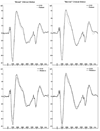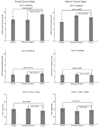Abnormal auditory N100 amplitude: a heritable endophenotype in first-degree relatives of schizophrenia probands
- PMID: 18701089
- PMCID: PMC2653714
- DOI: 10.1016/j.biopsych.2008.06.018
Abnormal auditory N100 amplitude: a heritable endophenotype in first-degree relatives of schizophrenia probands
Abstract
Background: N100 evoked potential amplitude and gating abnormalities have been widely observed in schizophrenia patients. However, previous studies have been inconclusive as to whether similar deficits are present in unaffected family members. The Consortium on the Genetics of Schizophrenia (COGS) is a multisite National Institute of Mental Health (NIMH) initiative examining neurocognitive and neurophysiological measures as endophenotypes for genetic studies of schizophrenia. We report initial results from the COGS dataset of auditory N100 amplitude and gating as candidate endophenotypes.
Methods: Evoked potential data were acquired from 142 schizophrenia probands, 373 unaffected first-degree relatives, and 221 community comparison subjects (CCS), using an auditory paired-click stimulation paradigm. Amplitude of the N100 response to each click and the click 2/click 1 ratio were dependent variables. Heritability was estimated based on kinships using Solar v.2.1.2. Group differences were examined after subjects were categorized as either "broad" or "narrow," based on the presence (broad) or absence (narrow) of nonpsychotic psychiatric comorbidity.
Results: Heritability estimates were .40 and .29 for click1 and click2 amplitudes and .22 for the ratio. Broad and narrow patients both had impaired click 1 amplitudes. Broad relatives, but not narrow relatives, exhibited similar impairments. There were no group differences for either click 2 amplitude or the gating ratio.
Conclusions: N100 amplitude is a heritable measure that is abnormal in patients and a subset of relatives for whom psychiatric comorbidity may be a genetically associated phenotype. Auditory N100 gating, although heritable, is less viable as a schizophrenia endophenotype.
Figures



References
-
- Gottesman II. Schizophrenia Genesis: The Origins of Madness. New York: W.H. Freeman; 1991.
-
- Braff DL, Freedman R. Endophenotypes in studies of the genetics of schizophrenia. In: Davis KL, Charney D, Coyle JT, Nemeroff CB, editors. Neuropsychopharmacology: The Fifth Generation of Progress. Philadelphia: Lippincott/Williams & Wilkins; 2002. pp. 703–716.
-
- Harrison PJ, Weinberger DR. Schizophrenia Genes, Gene Expression, and Neuropathology: On the Matter of Their Convergence. Mol Psychiatry. 2005;10:40–68. - PubMed
-
- Tsuang MT, Stone WS, Faraone SV. Genes, Environment and Schizophrenia. Br J Psychiatry. 2001 Suppl. 40:s18–s24. - PubMed
Publication types
MeSH terms
Grants and funding
- P50 MH064045/MH/NIMH NIH HHS/United States
- R01 MH084071/MH/NIMH NIH HHS/United States
- MH064045/MH/NIMH NIH HHS/United States
- R01-MH065571/MH/NIMH NIH HHS/United States
- R01-MH65578/MH/NIMH NIH HHS/United States
- R01 MH065558/MH/NIMH NIH HHS/United States
- MH43292/MH/NIMH NIH HHS/United States
- R01 MH065562/MH/NIMH NIH HHS/United States
- R01-MH65558/MH/NIMH NIH HHS/United States
- R01 MH065588/MH/NIMH NIH HHS/United States
- R01-MH065554/MH/NIMH NIH HHS/United States
- R01-MH065562/MH/NIMH NIH HHS/United States
- R01 MH065707/MH/NIMH NIH HHS/United States
- R01 MH065571/MH/NIMH NIH HHS/United States
- R01-MH65707/MH/NIMH NIH HHS/United States
- R01 MH043292/MH/NIMH NIH HHS/United States
- R29 MH043292/MH/NIMH NIH HHS/United States
- R01 MH079777/MH/NIMH NIH HHS/United States
- R01 MH065554/MH/NIMH NIH HHS/United States
- R01 MH065578/MH/NIMH NIH HHS/United States
- R01-MH65588/MH/NIMH NIH HHS/United States
- MH79777/MH/NIMH NIH HHS/United States
LinkOut - more resources
Full Text Sources
Medical

